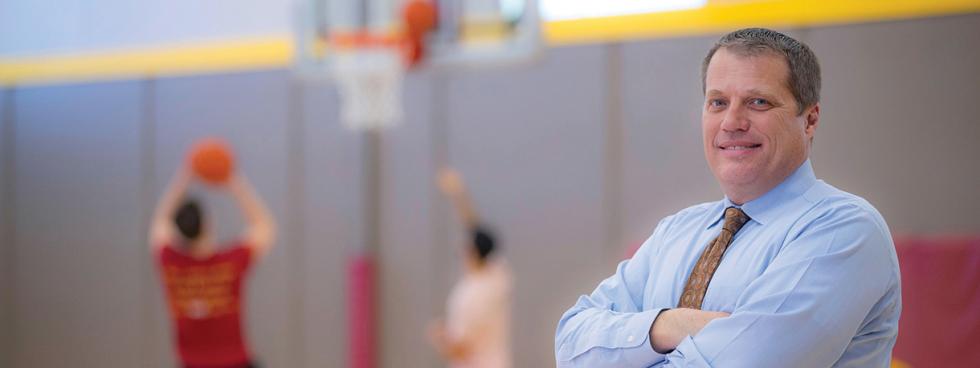
Athletic Day Job
Dr. Tim Day’s day job would be enough for most people.
A faculty member in the Department of Biomedical Sciences since 2000, Day has maintained a high level of productivity in research and teaching. His research focus is on neuromuscular systems of parasitic worms and the identification of molecular targets for new drugs. As a classroom instructor, his student evaluations are among the highest in the College of Veterinary Medicine.
But it is the professor of biomedical sciences other “job” that is a little out of the ordinary.
Since 2010, Day has served as the Faculty Athletic Representative (FAR) for Iowa State University. It’s one of those other duties as assigned that “can consume a lot of my time,” he says.
“Once you figure out what you’re doing in this role, typically universities want to keep you on,” Day said. “But you don’t want to get too cozy with the Athletics Department. You want someone to do the job objectively.”
As Iowa State’s FAR, Day reports directly to the University President. Four different individuals have served in that role during Day’s tenure as FAR and each has been very supportive.
“This position is designed to protect the president and the institution, to project the president’s presence into the Athletics Department and to help athletics follow the rules,” Day said. “I’ve always worked for presidents who have clarified what my job was and then they have let me do it.”
Day says working with the Athletics Department and athletic director Jamie Pollard has been a treat.
“Coaches and the athletics administration at Iowa State want to do things the right way,” he said. “I’m there to help them find where the institution’s interests are and they are all open to it.
“I give a lot of credit to Jamie Pollard. He has high standards of whom he hires. Make no mistake about it, winning is important at Iowa State, but we don’t strive to win at all costs.”
That tone of expectations and culture are so engrained into the coaching staff that there has been just one major issue during Day’s tenure as FAR. And even that – an instance where coaches weren’t correctly logging unanswered phone calls to recruits – was what Day described as the university “not doing anything unethical, just not following a small administrative rule, but not doing it many, many times.”
In addition to serving as Iowa State’s FAR, Day was also the Big XII’s representative to the NCAA Division I Council. There are 32 athletic conferences in Division I. Of those, 31 sent athletic directors as their representative.
All but the Big XII.
“I give credit to the Big XII,” Day said. “They genuinely listen to the faculty reps in conference governance. We’re taken very seriously.”
The additional assignment resulted in between four and five meetings a year over the past four years. During that time period, Day says several difficult decisions were made. And even with the additional time constraint, he has enjoyed his time on the Council.
“Even though I was the only faculty rep, I was treated very well,” he said. “It was a great experience. I got to see how the sausage was made.”
Day’s influence on collegiate athletes have obviously extended to Iowa State. He was a driving force in the Athletics Department’s decision to fund grants to non-athletes – students who experience tough financial times in their junior and senior years.
Still it is the 450 student-athletes that is Day’s primary focus as Iowa State’s FAR. At the beginning of each season, he makes plans to go to as many sporting activities as possible.
“I want to see all the sports and the student-athletes participate,” he said. “But in reality, I probably attend more practices than actual competitions, which in many ways is more important. That way I can better understand the student-athlete experience.”
March 2019
